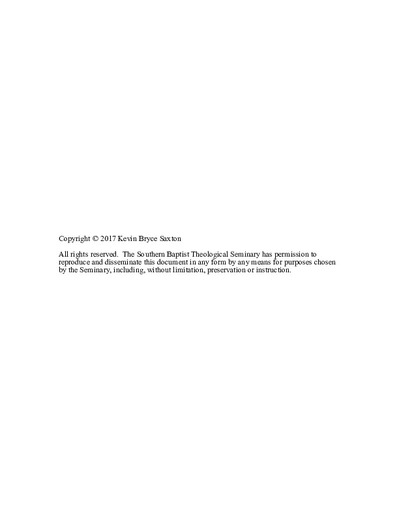Family Ministry and Evangelism: An Empirical Study of Family Ministry Engagement and Baptism Ratios in the Southern Baptist Convention
Subject
Church work with families--Southern Baptist ConventionBaptism--Southern Baptist Convention
Southern Baptist Convention--Statistics
Evangelistic work--Southern Baptist Convention
Abstract
Proponents of a family ministry strategy believe that Christian parents are called to be the primary disciple-makers in their children’s lives and that the church is called to equip parents for that important task. This type of strategy is commonly critiqued as an internally focused strategy that neglects another very important part of Christian discipleship, evangelism. This study empirically addresses that critique by examining baptism ratios in relation to family ministry emphasis within the Southern Baptist Convention.
Chapter 1 establishes the need for this study by outlining the critique. The critique is one which finds proponents outside of family ministry strategy, but also has support from within family ministry strategy as family ministry practitioners within various stream of family ministry philosophy offer critiques of other family ministry models. This chapter also outlines the procedure to be followed to accomplish the study.
Chapter 2 is an exploration of the precedent literature in the fields of both family ministry and evangelism. An emphasis on both of these fields is important as the two biblical priorities of family ministry and evangelism are meant to function in tandem and not in competition. When juxtaposed with the precedent literature in the field of evangelism in this chapter, the precedent literature in the field of family ministry indicates that family ministry is not only an evangelistic endeavor in itself, but is part of an overall strategy to be evangelistically effective outside of the walls of the church.
The third chapter of this study outlines the methodological design of the study. There are two components to the way in which this study was accomplished. First, a survey was built directly from DNA of D6’s Church Health Assessment. Applicable portions of this verified instrument were disseminated electronically throughout the Southern Baptist Church. Responding churches received scores based upon their responses that were used to rate the level of engagement in family ministry within those churches. Demographic information was also gathered from those churches and was used to access the individual Annual Church Profiles for the purpose of ascertaining the ratio of average weekly attenders to baptisms within those congregations. This data was then used to conduct the analysis portion of the study.
Chapter 4 contains the analysis of the information gathered through this empirical study. The variables of family ministry engagement and baptism ratio were measured for relationship to determine if there is any correlation between the two variables. This was also done with three individual sections of the Church Health Assessment used in the survey portion of the study. The data was also examined for any other trends that may illuminate a causal relationship.
Finally, chapter 5 addressed conclusions that could be drawn from this research. These conclusions are used to respond to the critique that family ministry philosophy is an inwardly focused strategy that is ineffective for reaching those who are far from God outside of the walls of the church. In addition, this chapter provides suggestions for future research in the area of study, as well as the individual disciplines of both family ministry and evangelism.

